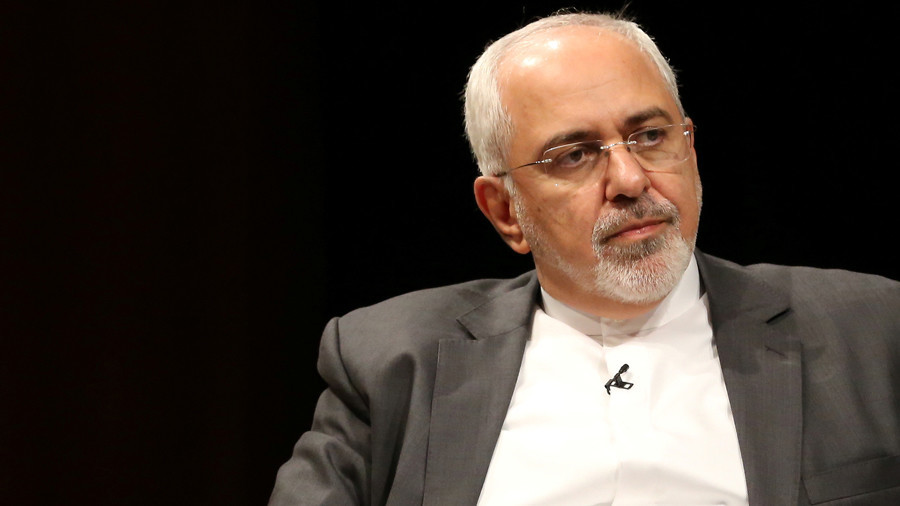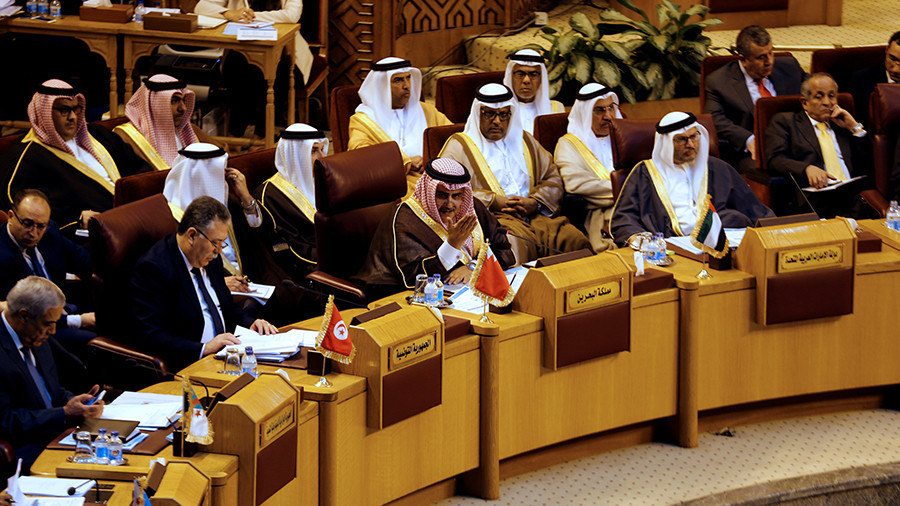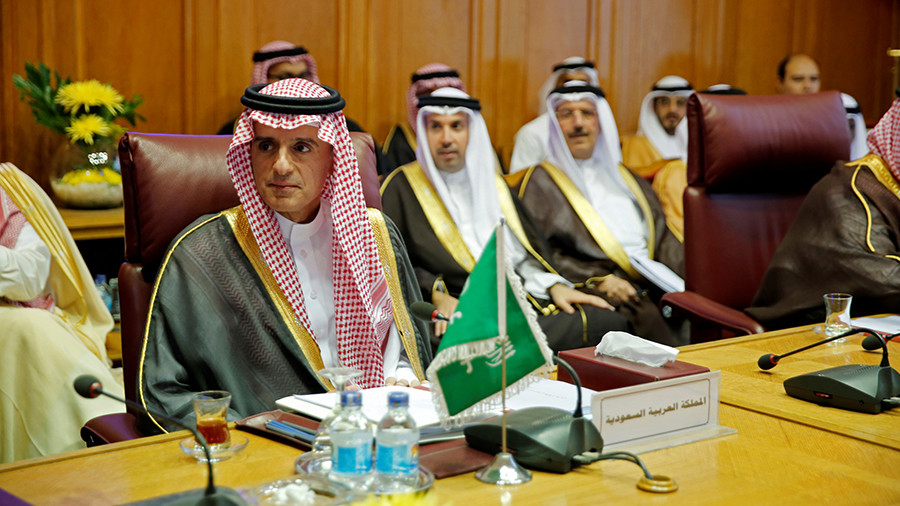Riyadh
'fuels terrorists, wages war' while Tehran works on regional peace
process – Iranian FM

RT,
19
November, 2017
Iran’s
foreign minister has said Saudi Arabia accusing Tehran of
"destabilization" can only be described as "ironic,"
as his nation is involved in successful talks on the Syrian peace
process, while the Saudis are provoking new regional crises.
Tehran
has been working with international partners, such as Russia and
Turkey, to ensure ceasefire in Syria and pave the way for further
political processes there, the Foreign Minister of the Islamic
Republic of Iran, Javad Zarif, said on Sunday.
At the same time,
Riyadh "fuels
terrorists, wages war on Yemen, blockades Qatar [and] foments crisis
in Lebanon," Zarif
wrote on Twitter.
Working with Turkish & Russian counterparts to build on ceasefire we achieved in Syria & preparing for inclusive dialog among Syrians. Irony is KSA accuses Iran of destabilization, while itself fuels terrorists, wages war on Yemen, blockades Qatar & foments crisis in Lebanon.
The
Iranian minister posted his statement following a new round of talks
with his Russian and Turkish counterparts, Sergey Lavrov and Mevlut
Cavusoglu, respectively. The three senior diplomats met in Antalya,
Turkey on Sunday, for consultations on the Syrian conflict.
Ahead
of the summit of the three states' leaders in Sochi next week, the
foreign ministers coordinated recommendations on how to proceed with
the Syrian dialogue, paving the way for peaceful solutions in the
war-torn country.
"Our
work has been productive, and we've agreed on all key issues,"
Sergey Lavrov said Sunday. The officials acknowledged the
de-escalation of violence in Syria, which would allow for a political
settlement.
Ankara,
Moscow and Tehran are aiming at "rebuilding
trust among Syrians" so
the issues within the country can be solved through "all-inclusive
dialogue to find and reach compromise in the interests of united and
strong Syria," the
Russian Foreign Ministry said in a statement. The joint efforts of
international partners within the so-called Astana peace process have
created the conditions for inter-Syrian talks under the auspices of
the United Nations, it dded.
The
three states act as guarantors of four de-escalation zones in Syria,
initially proposed by Moscow and agreed during talks in the Kazakh
capital, Astana, earlier this year. Aimed at separating terrorist
groups such as Islamic State (IS, formerly ISIS, ISIL) and the former
Al-Nusra Front from so-called moderate opposition formations, the
deal has been approved by the Syrian government.
Russian, Iranian and
Turkish forces are monitoring the situation in the designated zones
to avoid clashes between the warring factions, while efforts are in
place to improve access for aid for civilians living in the areas.
And threats from the Sunnis
'No Arab capital safe from Iran’s missiles,’ Saudi FM warns at emergency meeting

Arab
foreign ministers meet at the request of Saudi Arabia, in Cairo,
Egypt, November 19, 2017 © Amr Abdallah Dalsh / Reuters
Saudi
Arabia urged fellow Arab League nations to find a “non-compromise”
solution to deal with “Iran’s aggression” and “disregard for
international law” during a specially-summoned foreign ministers’
meeting in the Egyptian capital, Cairo.
“We
will not stand idly by in the face of Iran’s aggression,” Riyadh’s
foreign minister, Adel al-Jubeir, said in public remarks to the
assembled officials.
The
Saudi official accused Tehran of “meddling” in
various Middle Eastern states, particularly focusing on the Houthi
faction in Yemen, and Hezbollah in Lebanon.
“Iran
created agents in the region, such as the Houthi and Hezbollah
militias, in total disregard for all international principles,” said
al-Jubeir.

From
Press-TV
Saudi
Arabia is trying to garner the support of the Arab league to push the
United Nations Security Council into an anti-Tehran resolution.
During
the foreign ministerial Arab League meeting which was held by the the
request of Saudi Arabia in Cairo on Sunday, Arab League chief Ahmed
Aboul-Gheit said that they planned to "brief the UNSC on Iran's
destabilizing policies in the region."
“We
have not taken a decision to ask the Security Council to meet, but we
are just briefing the council and maybe the next stage would be for
us to meet and call for a Security Council meeting and submit a draft
Arab resolution (against Iran)."
Meanwhile,
Israeli minister of military affairs has extended the hand of
friendship to Arab countries, calling on them to form an alliance
against Iran.
Avigdor
Lieberman wrote on his Facebook page on Saturday that the Middle East
region now requires an anti-Iran coalition.
During
the Arab league summit, Adel al-Jubeir reiterated Riyadh’s
accusations that Iran is arming Yemen’s Ansarullah movement, who
have been resisting the kingdom’s deadly aggression against the
country.
On
Sunday, a UNSC-appointed panel said that it has seen no evidence to
support Saudi Arabia’s claims that missiles have been transferred
to Yemen’s Houthi fighters by external sources.
A
United Nations Security Council-appointed panel says it has seen no
evidence to support Saudi Arabia’s claims that missiles have been
transferred to Yemen’s Houthis by external sources.
Jubeir
also claimed that Iran was responsible for a recent oil pipeline
blast in Bahrain.
On
Friday, Iran dismissed a recent allegation linking the Islamic
Republic to an oil pipeline fire near the Bahraini capital Manama
with Iran's Foreign Ministry spokesman Bahram Qassemi vehemently
dismissing the accusations as "delusional."
Iran
has on multiple occasions rejected all of Saudi Arabia’s
accusations as baseless, the latest of which being earlier in the day
when Iranian Foreign Minister Mohammad Javad Zarif criticized the
Saudis for pursuing policies aimed at sowing discord among regional
states.
He
noted that while Saudi Arabia accuses Iran of taking steps to
stabilize the region, it is itself fueling terrorists in the region,
waging war in Yemen, and fomenting crisis in Lebanon.
Lebanon’s
Foreign Minister Gebran Bassil was conspicuously absent at the
emergency Arab League summit.
No comments:
Post a Comment
Note: only a member of this blog may post a comment.